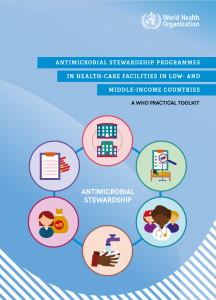
There are currently not sufficient new antibiotics in the clinical pipeline to cover our future needs for treatments of bacterial infections, which is why antibiotics must be treated as a limited resource. That is where antimicrobial stewardship comes in – to help physicians, pharmacists, other health care workers and us all, to use antibiotics more responsibly.
Stewardship is defined as “the careful and responsible management of something entrusted to one’s care.” It was originally applied in the health-care setting as a tool for optimizing antimicrobial use, termed “antimicrobial stewardship” (AMS).Stewardship has since been applied in the context of governance of the health sector as a whole, taking responsibility for the health and well-being of the population and guiding health systems at the national and global level.
With rates of Antimicrobial Resistnace (AMR) increasing worldwide, it’s essential that antibiotics only be prescribed – and that last-resort antibiotics (AWaRe RESERVE group) be reserved – for patients who truly need them. Hence, AMS and its defined set of actions for optimizing antibiotic use are of paramount importance.